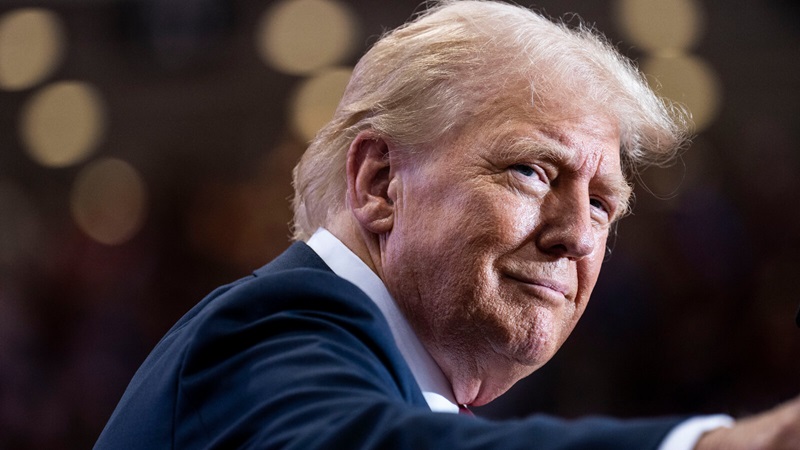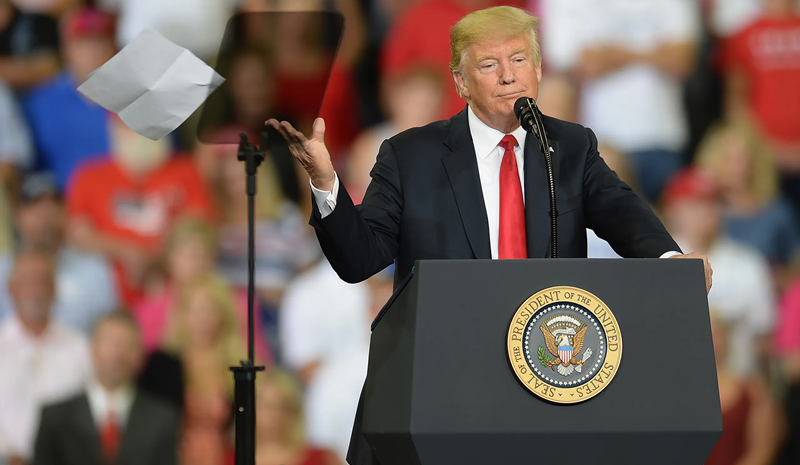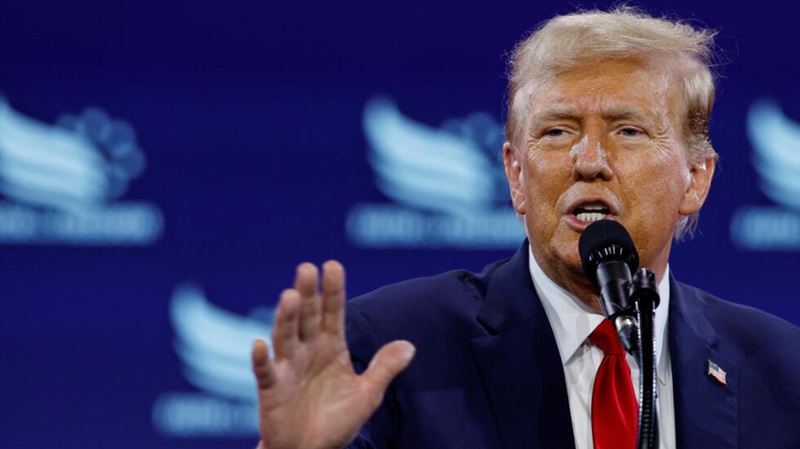In a recent speech to Christian voters, President Trump made a bold promise that seemed to resonate with many in the crowd. He assured them that if he was re-elected, they would no longer have to worry about the burdens of voting. Trump claimed that under his leadership, the future would be easier for Christians, as their values and beliefs would be protected without the need for them to participate in the political process.
This message seemed to strike a chord with many in the audience, who have long felt marginalized and overlooked by the government. The idea of not having to vote in order to see their interests represented was a tempting proposition for many in attendance. Trump’s promise of a future where their voices would be heard without having to engage in the messy world of politics seemed to offer a sense of relief and hope for a better tomorrow. Whether or not this promise will come to fruition remains to be seen, but for now, it has certainly captured the attention and support of many Christian voters.

Trump’s Controversial Claim: What It Means for Christian Voters
Many Christian voters have been left divided and conflicted by President Trump’s controversial claim. While some see his stance as a strong defense of American values and a commitment to protecting our borders, others view it as a betrayal of Christian principles of love and compassion for the stranger and the oppressed. For many, the issue goes beyond politics and policy, touching on deeply held beliefs about justice, fairness, and humanity.
Some argue that supporting Trump’s claim is a way to uphold the rule of law and protect our country from potential threats, while others believe that it goes against the core teachings of Christianity, which call for welcoming the stranger and caring for the vulnerable. As the debate rages on, many Christian voters find themselves grappling with questions of morality, ethics, and the responsibilities of citizenship. Ultimately, the decision on how to interpret and respond to Trump’s claim is a personal one, shaped by individual beliefs and values. But one thing is clear — the issue has sparked a crucial conversation within the Christian community about what it means to live out one’s faith in a complex and divided world.
The Impact of Trump’s Promise on Christian Voting Dynamics
Donald Trump’s promise to protect religious freedom and uphold Christian values has had a significant impact on voting dynamics within the Christian community. Many devout Christians see Trump as a champion for their beliefs and values, particularly on issues such as abortion, same-sex marriage, and religious liberty. Trump’s promise to appoint conservative judges who will protect these values has resonated with many Christian voters, who see the protection of these principles as essential to their faith.
As a result, Trump has garnered strong support from evangelical Christians, who make up a significant portion of the Republican base. However, Trump’s brash and controversial rhetoric has also alienated some Christians who feel that his behavior does not align with their moral beliefs. Despite this, many Christians prioritize policy outcomes over personal conduct, leading them to support Trump despite any reservations they may have about his character. Overall, Trump’s promise to protect Christian values has been a key factor in shaping voting dynamics within the Christian community, with many believers viewing him as a defender of their faith in a rapidly changing cultural and political landscape.

Unpacking Trump’s Remark: What It Means for the Future of Christian Voters
President Trump’s recent remark about Christian voters has sparked a debate about the future of their influence in American politics. Some argue that his comments have exposed a divide within the Christian community, with some feeling alienated by his rhetoric while others continue to support him unwaveringly. The implications of this divide could have far-reaching consequences for the future of Christian voters in shaping political decisions.
Those who are critical of Trump’s remarks believe that it may lead to a reevaluation of the relationship between the religious right and the Republican party. They argue that Trump’s controversial statements may push some Christian voters to reconsider their support for the party and seek alternative candidates who align more closely with their beliefs. On the other hand, Trump’s staunch supporters within the Christian community may see his remarks as a rallying cry to continue to stand by him, regardless of any perceived missteps. This could further solidify the bond between the religious right and the Republican party, ensuring that Christian values remain a key factor in shaping political agendas.
Ultimately, the future of Christian voters will likely be influenced by how they respond to Trump’s remarks and whether they choose to prioritize their religious beliefs over political allegiances. The divide within the Christian community may signal a shift in the way that faith-based voters engage with the political process, potentially leading to a more nuanced and diverse representation of Christian values in future elections.
Exploring the Consequences of Trump’s Statement for Christian Voting Trends
President Trump’s statements have had a significant impact on Christian voting trends in recent years. His rhetoric and policies have polarized the Christian community, with some supporting his hardline stance on immigration and others rejecting his divisive language. Many Christians have been drawn to Trump’s promises to protect religious freedom and appoint conservative judges, while others have been troubled by his inflammatory remarks and behavior.
This divide has led to a shift in voting patterns among Christians, with some turning away from traditional Republican candidates and others doubling down on their support for Trump. This has created a complex and nuanced landscape within the Christian community, with many grappling with how to align their faith with their political beliefs. The consequences of Trump’s statements for Christian voting trends are still unfolding, as the community continues to navigate this challenging and divisive political climate. Ultimately, the impact of Trump’s statements on Christian voting trends will likely be felt for years to come, as the community wrestles with how to reconcile their beliefs with the actions of their political leaders.

The Potential Effects of Trump’s Election Promise on Political Involvement
The potential effects of Trump’s election promise on political involvement could be significant. By promising to build a wall along the US-Mexico border and cracking down on immigration, Trump has tapped into a divisive issue that has already stirred up strong emotions on both sides. This could lead to increased engagement from individuals who feel strongly about immigration policy and feel compelled to take action, whether through protests, advocacy, or voting.
On the other hand, Trump’s stance on immigration could also discourage some individuals from participating in the political process, particularly those who feel marginalized or targeted by his policies. This could lead to decreased political involvement from certain communities who may feel alienated or disenfranchised. Additionally, Trump’s promises to repeal certain trade agreements and renegotiate others could also impact political involvement, as individuals and groups affected by these policies may feel compelled to speak out and take action.
Overall, Trump’s election promise could have a range of effects on political involvement, both positive and negative, depending on one’s perspective and personal experiences. It remains to be seen how these promises will play out in the political arena and how they will ultimately impact the level of engagement from the American public.
